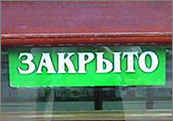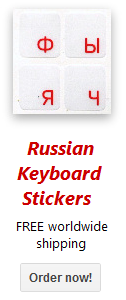| FR | About us | Home | User agreement | Link to us |
Russian Adverbs of Manner
Adverbs of manner describe actions and answer the questions Как? and Каким образом? (How?) Consider the following examples:
Все внимательно слушали.
(Everyone was listening carefully.)Она быстро бегает.
(She runs fast.)
Russian adverbs of manner are formed from adjectives with the help of:
- the suffix
-o
хороший -> хорошо
- the prefix
по- and the suffix
-и
немецкий -> по-немецки
- the prefix
по- and the suffixes
-ому, -ему
добрый -> по-доброму
хороший -> по-хорошему
Just like adjectives, adverbs of manner have degrees of comparison. The degrees of comparison for adverbs of manner are similar to those for adjectives. However, the difference is that adverbs of manner refer to a verb while adjectives refer to a noun. The following examples will crack the code on this distinction.
Он хорошо плавает, но я плаваю лучше.
(He swims well, but I swim better.)
Note: The adverbs хорошо and лучше refer to the verb плавает, and answer the adverb question Как? (How?)
Вчера была хорошая погода, но сегодня лучше.
(The weather was nice yesterday, but it is better today.)
Note: The adjective хорошая and лучше refer to the noun погода, and answer the adjective questions Какая? Какова? (What?)
Got questions?
Ask them in the Russian Questions and Answers — a place for students, teachers and native Russian speakers to discuss Russian grammar, vocabulary, pronunciation, and other aspects of the Russian language.
Copyright 2001-2026 MasterRussian.com | Privacy Policy | Contact Us
 Russian Lessons
Russian Lessons
- Russian alphabet
- Names of letters
- Russian Q&A new
- Pronunciation: Cons.
- Pronunciation: Vowels
- Noun Gender/Number
- Cases of Nouns
- Russian Greetings
- Personal Pronouns
- Learning Russian
- 1000 Common Words
- 500 Russian Verbs
- Top Russian Nouns
- » All lessons
- » Guest lessons
 Browse Topics
Browse Topics
- Start learning Russian
- Forum
- Bookstore
- Dictionaries
- Russian - basic
- Russian - adv
- Pronunciation
- Russian Blog new
- Reading
- Test & quizzes
- Translation
- Verbs
- Verb Conjugations
- Russian numbers
- Russian Tests new
- Vocabulary
- Writing
- Folk music
- Fun stuff
- Leo Tolstoy
- Learner's lore
- Literature
- Personal blogs
- Picture Dictionary new
- Proverbs
- Publications
- Radio & TV
- Russian culture
- Schools in Russia
- Russian Words
- Russian names
- Software
- Russian Words iPhone

Search MasterRussian

English » Russian dictionary

WORD OF THE DAY
![]() RSS
|
iGoogle
|
My Yahoo!
RSS
|
iGoogle
|
My Yahoo!
Meaning: to be able to, can, may
Pronunciation: [mohch']
Learn Russian words more... »
TODAY'S STREET SIGN

Russian: Закрыто
English: Closed
FOLLOW US ON TWITTER

MasterRussian on Twitter


